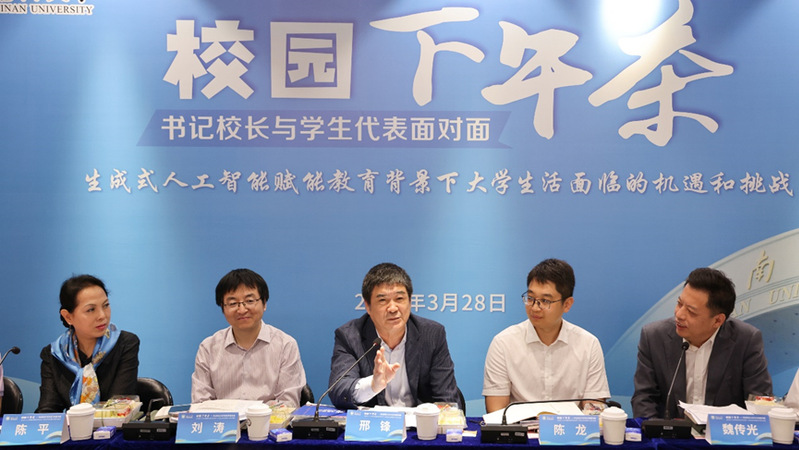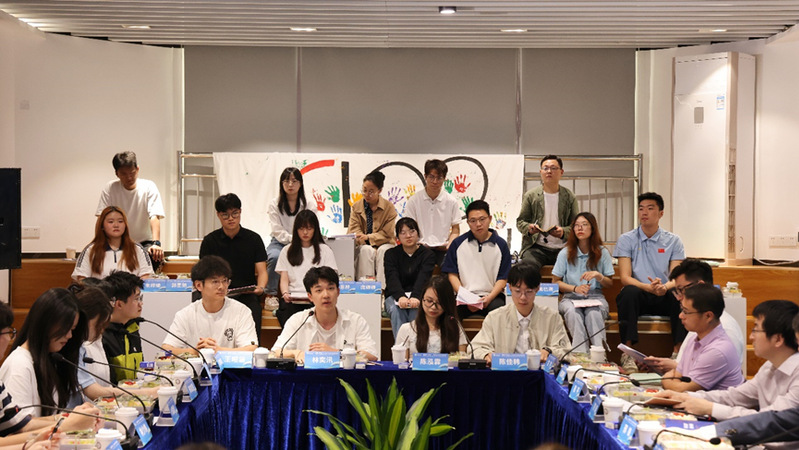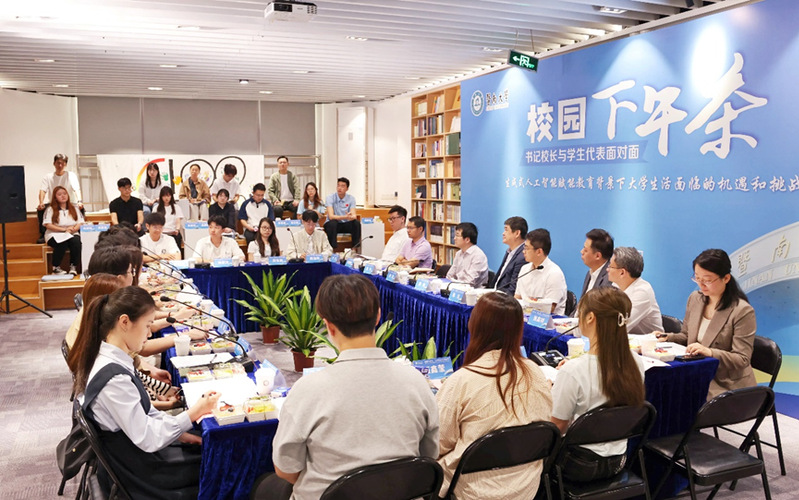- ABOUT JNU
- ADMISSION
-
ACADEMICS
- Schools and Colleges
-
Departments and Programs
- Arts College of
- Chinese Language and Culture College of
- Economics College of
- Electrical and Information Engineering College of
- Foreign Studies College of
- Information Science and Technology College of
- Environment School of
- Humanities School of
- International Business School
- International Studies School of
- Journalism and Communication College of
- Law School
- Liberal Arts College of
- Life Science and Technology College of
- Management School of
- Marxism School of
- Medicine School of
- Pharmacy College of
- Physical Education School of
- Science and Engineering College of
- Shenzhen Tourism College
- Research Institute
- Research Center
- Programs in English
- Majors
- Study Abroad
- Online Learning
- RESEARCH
- CAMPUS LIFE
- JOIN US
Latest News
Principal Xing Feng Inspires Students to Embrace Knowledge in the Era of AI
Author: Li Weimiao, Zeng Xiaotao, Zhou Huiqian
Publisher: Publicity Department of JNU Party Committee
Date: March 28, 2025
On March 28, 2025, under the warm sun illuminating Jinan Campus and amidst the bloom of kapok flowers, Jinan University launched a distinctive ideological and political open class, stirring enthusiasm among students and faculty alike. The event featured Xing Feng, a member of the Chinese Academy of Engineering and President of Jinan University, who engaged nearly 30 representatives from various undergraduate, master’s, and doctoral programs in a compelling discussion about the “Opportunities and Challenges of University Life in the Age of Generative AI.”

(Join Us for “Campus Afternoon Tea”)
This session formed part of the “Campus Afternoon Tea” series, intended to cultivate direct dialogue between university leaders and student representatives. Participants explored crucial questions regarding the enhancement of human value in the artificial intelligence landscape and the balance between AI-assisted teaching and the development of independent thinking skills.
Student representatives brought forth practical examples illustrating how AI technology is enriching learning, research, and daily life across disciplines. They discussed the myriad opportunities and challenges that AI presents to university students, voicing expectations and recommendations concerning AI integration in education, career development, innovative thinking, and practical skill enhancement.

(Gather with Us at the “Campus Afternoon Tea”)
In response, President Xing commended the students for their insightful contributions, acknowledging their queries and concerns. He highlighted the transformative impact of AI on the global education ecosystem, stressing that traditional single-discipline knowledge is becoming insufficient to tackle complex challenges. “Interdisciplinary knowledge is increasingly becoming a cornerstone of competitive advantage,” Xing noted, outlining the university’s commitment to fostering multi-disciplinary talent through initiatives like top-tier talent innovation classes.
He metaphorically urged students to view education as equipping them with a “hunting rifle” rather than merely sustenance, encouraging them to continually strengthen their capabilities for sustainable development.
Xing emphasized the crucial role universities play in nurturing critical thinking and problem-solving skills, particularly in the face of advancements in AI technology. He advocated for solid logical reasoning and a foundation in the humanities as essential for developing these skills. According to him, mastering fundamental disciplines not only equips students with necessary knowledge but also fosters critical thinking vital for navigating the AI-driven landscape.
Moreover, he reiterated that the essence of education lies in cultivating individuals rather than merely training them in specific majors. Recognizing Jinan University’s advantage of multicultural integration, he underscored the contemporary value of the Jinan spirit, which embodies “loyalty, sincerity, integrity, respect, self-improvement, and harmonious diversity.” This principle remains integral to the university’s mission to instill traditional Chinese cultural values and nurture students as bearers of the Jinan spirit.
Xing encouraged students to maintain an open and inclusive mindset towards emerging technologies, emphasizing the importance of developing critical thinking, interdisciplinary perspectives, and holistic skills. He urged them to embrace the burgeoning opportunities of the AI era and to embody the Jinan spirit. “Be vigilant against becoming overly dependent on technology,” he advised, stressing the necessity of upholding academic integrity and becoming reliable custodians of human values in this new digital landscape.
During the session, members of the university’s administration, including Chen Long from the Publicity Department, Liu Tao, Executive Dean of the Undergraduate School, Wei Chuanguang, President of the Marxist School, Hui Qingming, Deputy Head of Graduate Work Department, and Chen Ping, President of the Institute of Cultural Heritage and Creative Industries, responded to student inquiries, providing clarity and viable solutions.
“This unique class has provided profound insights,” said Li Runying, a 2022 undergraduate from the School of Stomatology in Macau. “I aim to leverage my knowledge and enhance my competitiveness, aspiring to be a multifaceted talent skilled in both clinical expertise and AI literacy.”

(Enjoy Afternoon Tea)
Zhu Ziyu, a 2023 undergraduate from the Law School and Intellectual Property School in Hong Kong, expressed his gratitude for the opportunity to engage with President Xing and faculty. “Understanding how to navigate the AI era effectively will enable us to foster our personal development while embracing our responsibilities as future legal professionals.”
Guo Enguo, a doctoral student in the School of Mechanics and Architecture, remarked on the lasting impact of President Xing’s address. “I will carry forward his guidance by solidifying my professional foundation and applying AI technology to solve practical challenges, aligning my growth with the broader goal of national rejuvenation.”
The event was more than just a lecture; it was an enriching dialogue that empowered students to navigate the complexities of an AI-driven world while upholding the values and legacy of Jinan University.
NEWS
- About the University
- Quick Links
Copyright © 2016 Jinan University. All Rights Reserved.




